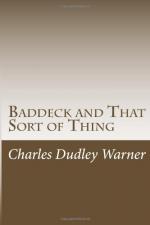The band had scarcely departed for some other haunt of slumber and weariness, when the notes of singing floated up that prolific alley, like the sweet tenor voice of one bewailing the prohibitory movement; and for an hour or more a succession of young bacchanals, who were evidently wandering about in search of the Maine Law, lifted up their voices in song. Boston seems to be full of good singers; but they will ruin their voices by this night exercise, and so the city will cease to be attractive to travelers who would like to sleep there. But this entertainment did not last the night out.
It stopped just before the hotel porter began to come around to rouse the travelers who had said the night before that they wanted to be awakened. In all well-regulated hotels this process begins at two o’clock and keeps up till seven. If the porter is at all faithful, he wakes up everybody in the house; if he is a shirk, he only rouses the wrong people. We treated the pounding of the porter on our door with silent contempt. At the next door he had better luck. Pound, pound. An angry voice, “What do you want?”
“Time to take the train, sir.”
“Not going to take any train.”
“Ain’t your name Smith?”
“Yes.”
“Well, Smith”—
“I left no order to be called.” (Indistinct grumbling from Smith’s room.)
Porter is heard shuffling slowly off down the passage. In a little while he returns to Smith’s door, evidently not satisfied in his mind. Rap, rap, rap!
“Well, what now?”
“What’s your initials? A. T.; clear out!”
And the porter shambles away again in his slippers, grumbling something about a mistake. The idea of waking a man up in the middle of the night to ask him his “initials” was ridiculous enough to banish sleep for another hour. A person named Smith, when he travels, should leave his initials outside the door with his boots.




